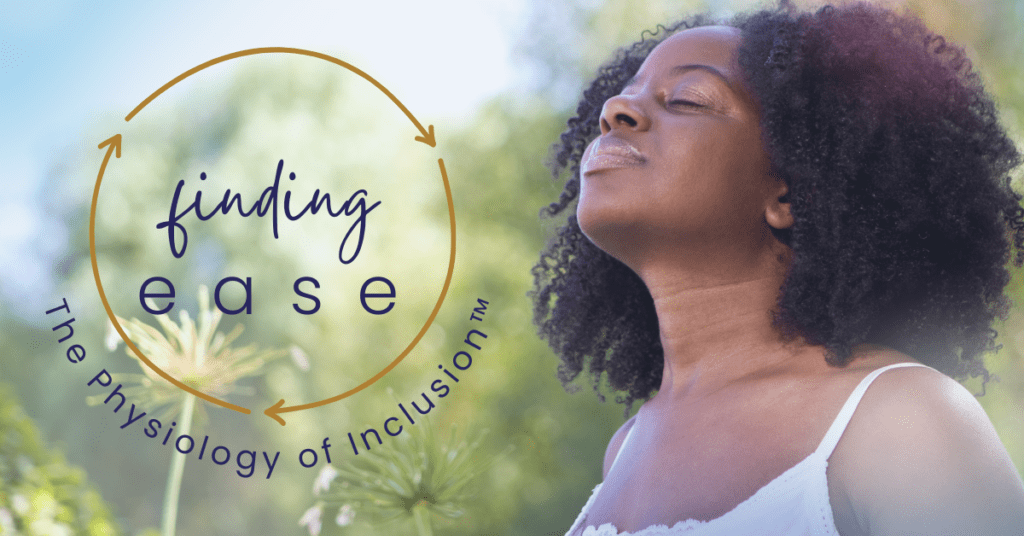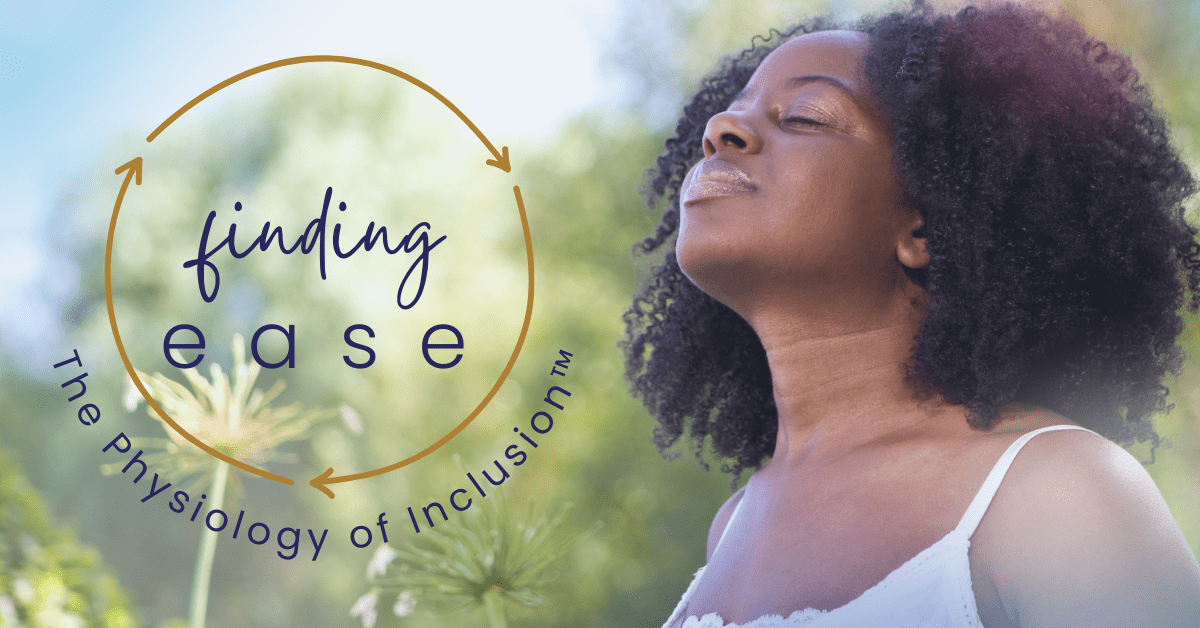
In the ever-changing landscape of diversity, equity, inclusion, and justice (DEIJ) work, self-care and well-being are essential for practitioners to navigate the challenges and sustain their efforts. The Physiology of Inclusion™ (POI) offers a comprehensive framework that promotes the well-being of DEIJ practitioners and leaders, enabling them to adapt and find peace while centering equity and justice in their work.
This post explores The Winters Group, Inc.’s latest Inclusion Solution LIVE podcast series, The Physiology of Inclusion™: Finding Ease. I will share an overview of POI, discuss why it is essential for DEI work, and highlight sample guided practices led by myself and Rochelle Younan-Montgomery, Instructional Designer at The Winters Group and my co-host on the podcast.
Finding Ease
During The Inclusion Solution LIVE podcasts, listeners will gain insights, engage in storytelling, and participate in guided exercises that create pause and relaxation, improve resilience, and foster healing. We aim to help listeners prioritize their well-being so they can approach DEIJ work with ease and effectiveness.
The Physiology of Inclusion™ (POI)
POI is a comprehensive system that incorporates both foundational and enabling components to enhance the well-being of DEIJ practitioners. By focusing on the foundational elements (physical, emotional, and mental presence) and leveraging the enabling components (spiritual, social, and practical presence), practitioners can cultivate resilience, empathy, and critical thinking, taking tangible actions to create a more inclusive and just society.
Physiology of Inclusion Foundational Elements:
The foundational components of POI serve as the bedrock for DEIJ practitioners. Practitioners can create a healthy base to engage in DEIJ work by focusing on physical, emotional, and mental presence.
- Physical Presence: Physical well-being is essential for DEIJ practitioners to sustain energy, clarity, and empathy. We all have a “body battery.” Engaging in self-care activities such as exercise, healthy eating, and adequate sleep fuels our “body battery.” Practices like yoga, stretching, Pilates, or strength training contribute to maintaining patience, reducing stress, and lowering anxiety.
- Emotional Presence: Cultivating emotional well-being is vital for DEIJ practitioners to engage polarizing people and process emotions. Therapy, journaling, and self-reflection foster emotional resilience and support the shift from criticism to allyship. Gratitude exercises, affirmations, or guided visualizations cultivate positive emotions, raise confidence, and prepare a person to connect with others.
- Mental Presence: Nurturing mental wellness allows DEIJ practitioners to maintain a broader perspective, challenge biases, and develop inclusive practices. Engaging in activities like reading, puzzles, and continuous learning develops critical thinking skills and helps generate new ideas. All these activities help a person establish neural plasticity, or neuroplasticity, the brain’s ability to adapt and change throughout life.
Physiology of Inclusion Enabling Elements:
The enabling components of POI support DEIJ practitioners in connecting with a higher purpose, building relationships, and taking practical action to drive change.
- Spiritual Presence: Spiritual self-care connects DEIJ practitioners to a higher power, fostering resilience and meaning in life. Practices like meditation, prayer, or communing with nature enable practitioners to pause, reflect, and refocus their efforts. Exploring guided visualizations, frequent walks in nature, gratitude rituals, or volunteering deepens spiritual presence and connection.
- Social Presence: Building a support network is crucial for DEIJ practitioners to combat isolation, rebuild trust, and cultivate empathy. Spending time with loved ones, joining communities, and engaging in meaningful conversations contribute to a sense of belonging and collaboration. Active listening, empathy exercises, or group dialogues enhance social presence and strengthen relationships.
- Practical Presence: Practical presence involves funneling your energy to foster well-being and center justice. Professional development, effective time management, financial stability, and personal growth have a practical purpose. They allow DEIJ practitioners to take tangible actions, advocate for systemic change, and promote diversity, equity, inclusion, and justice. Goal setting, action planning, or requiring accountability are focus areas of practitioners to ensure a meaningful impact.
Why POI Is Important for DEIJ Work
DEIJ work is in the political spotlight – challenging, and at the same time exhilarating. To manage the complexity of expectations, DEIJ practitioners need to prioritize their well-being and engage in practices that cultivate resilience, empathy, and critical thinking. POI provides a holistic approach that supports practitioners in sustaining their energy, maintaining mental clarity, and accomplishing goals. DEIJ work reimagines policies, practices, procedures, and ways of working and being that foster fairness, equity, and opportunity for all.
During the podcasts, Rochelle and I will offer guided practices to support DEIJ practitioners in finding ease and inner peace. In upcoming episodes, Rochelle’s guided practice will emphasize clearing away what is stagnant, reflecting on personal growth, and embracing joy and intentional actions. My guided practice will explore Insight Dialogue, a relational meditation that fosters self-awareness, mindfulness, empathy, and connection. These practices aim to enhance well-being, promote resilience, and support practitioners approaching DEIJ work with a non-anxious, affirming, and committed presence.
Join Us!
The Physiology of Inclusion™ offers a transformative framework for DEIJ practitioners to prioritize their well-being and find ease in their work. Practitioners can enhance their energy, resilience, empathy, critical thinking, and inclusive practices by addressing foundational and enabling components. The Inclusion Solution LIVE podcast series (available here, wherever you get your podcast, or on YouTube) offers support to the DEIJ community using storytelling and guided exercises that inspire listeners to embrace self-care and approach DEIJ work with renewed purpose and inner peace. By investing in their well-being, DEIJ practitioners can drive meaningful change and contribute to a more equitable and inclusive world that centers justice. We are here to help you be well so you can do well!



















